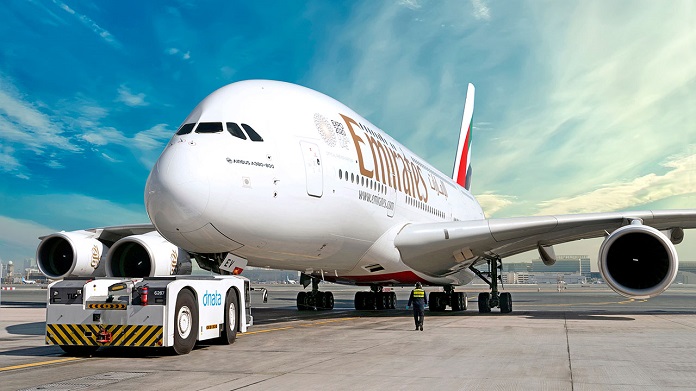The Emirates Group has announced its half-year results for its 2021-22 financial year.
- Group: Revenue up 81% to AED 24.7 billion (US$ 6.7 billion), and loss of AED 5.7 billion (US$ 1.6 billion) after last year’s loss of AED 14.1 billion (US$ 3.8 billion). Substantially improved results reflect recovery across all business segments and the easing of COVID-19 pandemic travel restrictions worldwide.
- Emirates: Revenue up 86% to AED 21.7 billion (US$ 5.9 billion), and loss of AED 5.8 billion (US$ 1.6 billion) compared to AED 12.6 billion (US$ 3.4 billion) loss for the same period last year. Revenue recovery is supported by increasing passenger demand and a continuous strong cargo business.
- dnata: Revenue up 55% to AED 3.7 billion (US$ 1 billion), profit of AED 85 million (US$ 23 million) after last year’s loss of AED 1.5 billion (US$ 396 million), as operations across all dnata business units globally recover from the substantial impact of COVID-19.
Group revenue was AED 24.7 billion (US$ 6.7 billion) for the first six months of 2021-22, up 81% from AED 13.7 billion (US$ 3.7 billion) during the same period last year.
This strong revenue recovery was underpinned by the easing of travel restrictions worldwide and the corresponding increase in demand for air transport as countries progressed their COVID-19 vaccination programmes.
The Group is reporting a 2021-22 half-year net loss of AED 5.7 billion (US$ 1.6 billion), substantially improved from its AED 14.1 billion (US$ 3.8 billion) loss for the same period last year.
The Group also reported an EBITDA of AED 5.6 billion (US$ 1.5 billion), a dramatic turnaround from a negative AED 43 million (US$ 12 million) EBITDA during the same period last year, illustrating its strong return to operating profitability.
The Group continued to maintain a healthy cash position which stood at AED 18.8 billion (US$ 5.1 billion) on 30 September 2021, compared to AED 19.8 billion (US$ 5.4 billion) as of 31 March 2021.
His Highness (HH) Sheikh Ahmed bin Saeed Al Maktoum, Chairman and Chief Executive, Emirates Airline and Group said: “As we began our 2021-22 financial year, COVID-19 vaccination programmes were being rolled out at unprecedented scale around the world. “Across the Group, we saw operations and demand pick up as countries started to ease travel restrictions. “This momentum accelerated over the summer and continues to grow steadily into the winter season and beyond. “Our cargo transport and handling businesses continued to perform strongly, providing the bedrock upon which we were able to quickly reinstate passenger services. “While there’s still some way to go before we restore our operations to pre-pandemic levels and return to profitability, we are well on the recovery path with healthy revenue and a solid cash balance at the end of our first half of 2021-22”.
Sheikh Ahmed added: “We would like to thank our customers for their continued support, as well as all our aviation and travel industry stakeholders and partners for their efforts that have made it possible for international air travel to resume safely and smoothly.” “Our ability to pivot and pull through the toughest period in our history to date can be attributed to Emirates’ and dnata’s strong brands, high-quality products and services, digital and innovation capabilities, and our amazing people. “We intend to continue investing in these core areas to take our business into the future, together with the leaner processes and new technology capabilities that we’ve implemented in the past months.”
Emirates airline
During the first six months of 2021-22, Emirates took delivery of 2 new A380s and retired 2 older aircraft from its fleet as part of its long-standing strategy to improve overall efficiency, minimise its emissions footprint, and provide high-quality customer experiences.
With a clear focus on restoring its passenger network and connections through its Dubai hub, Emirates responded with agility whenever travel restrictions were lifted to restart services or layer on additional flights. In July, it launched services to Miami, a new destination, and during the first half of 2021-22, Emirates also activated codeshare and interline partnerships with Airlink, Aeromar, Azul, Cemair and South African Airways to expand connectivity options for customers.
By 30 September, the airline was operating passenger and cargo services to 139 airports, utilising its entire Boeing 777 fleet and 37 A380s.
Emirates also continued to introduce initiatives that improve the travel experience, boost customer confidence, and enable secure and efficient operations. In June, Emirates became the first airline to sign up for the worldwide implementation of the IATA Travel Pass, in addition to its ongoing investments in additional biometric and other digital verification technologies at Dubai Airport.
For its premium customer and frequent flyers, Emirates reinstated more of its signatures Lounge and Chauffeur Drive services at key airports outside of Dubai, and it also launched an online subscription platform “Skywards+”, to offer its 27 million members easy access to customized rewards and privileges.
The Emirates Group has been able to tap on its own strong cash reserves, and access funding through its Owner and the broader financial community to support its business needs through the unprecedented challenges wrought on the aviation and travel industry by COVID-19. In the first half of 2021-22, its Owner further injected AED 2.5 billion (US$ 681 million) into Emirates by way of an equity investment and they continue to support the airline on its recovery path.
The Emirates Group’s employee base, compared to 31 March 2021, dropped marginally by 2% to an overall count of 73,571 on 30 September 2021.












